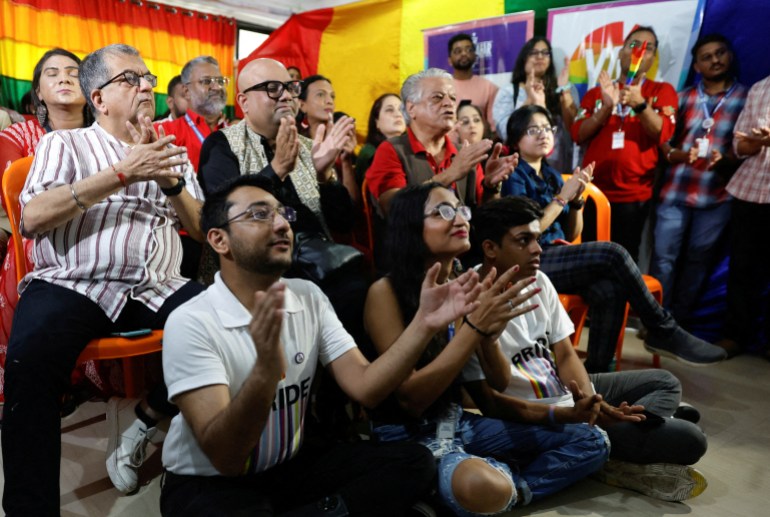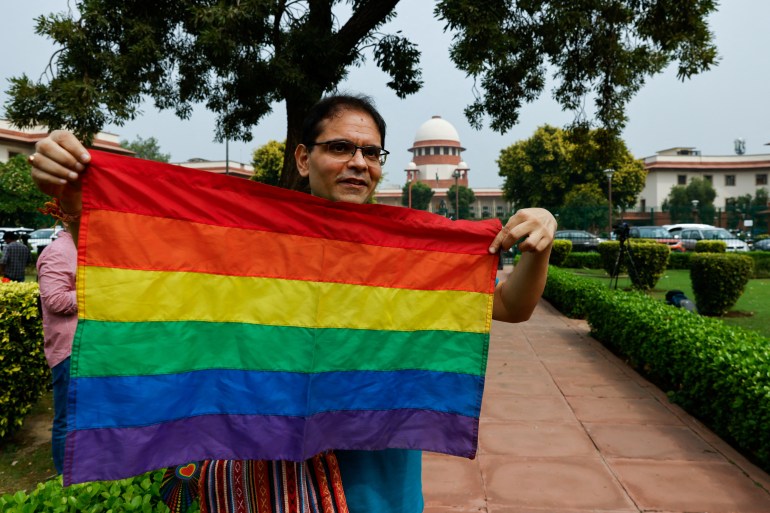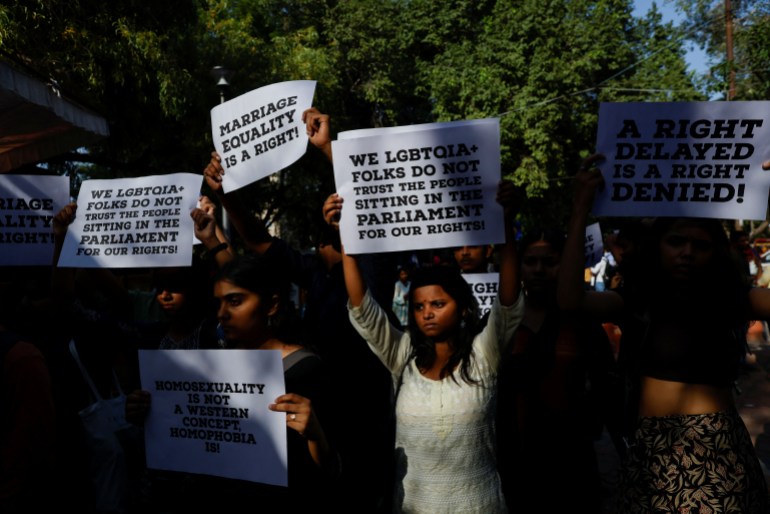[ad_1]
New Delhi, India – In the summer season of 2018, three our bodies have been recovered from the Sabarmati River in Ahmedabad, a sprawling metropolis in western India’s Gujarat state.
A lesbian couple – Asha Thakor, 30, and Bhavna Thakor, 28 – had died by suicide together with Asha’s three-year-old daughter. Before the 2 girls jumped into the water, they left a message written in purple lipstick on a wall alongside the riverfront.
“We are leaving the world which will never allow us to be one,” the inscription mentioned in Gujarati language.
Both the ladies have been married to males and had kids. A police investigation later discovered that they had met at an organization the place each of them labored. Their friendship quickly became a relationship, inflicting frequent fights inside their households.
All they wished was to spend their lives collectively. But that they had no social sanction or authorized rights to take action.
Rohin Bhatt, 25, was a pupil at Gujarat’s National Law University when he learn concerning the suicides by the 2 girls. He mentioned it shook his conscience.
Five years later, Bhatt was one of many key advocates petitioning for the legalisation of same-sex marriage earlier than India’s Supreme Court, which final week refused to rule on the problem in what the LGBTQ neighborhood known as a “heartbreaking setback”.
In its verdict last week, a five-judge bench headed by Chief Justice DY Chandrachud recognised that the LGBTQ neighborhood faces discrimination from the state however declined to get into “judicial lawmaking” on same-sex marriage, saying such a call fell exterior its purview and must be addressed by the Indian Parliament. It additionally dominated in opposition to granting adoption rights to single homosexual {couples}.

‘Government hostile to queer rights’
The ruling was a setback for India’s LGBTQ neighborhood. Many had anticipated the Supreme Court to grant them the correct to marry their companions.
“We have been told that we don’t deserve equal rights. We cannot marry. The buck has been passed to the government, which is hostile to queer rights,” Bhatt informed Al Jazeera. “This judgement not only affects me as a lawyer but also as a subject matter, a queer person myself.”
Bhatt and his associate, who didn’t wish to reveal his identification, met on Twitter, now X, final 12 months.
“It was love at first sight. We do want to get married, but we are stuck in a limbo,” he informed Al Jazeera.
“Now everything is going to be affected. It isn’t merely about marriage. It’s about a plethora of rights that emerge from recognition. Today we are stared at, discriminated against. People talk rubbish to us. Many lawyers argued these facets of discrimination before the court. But the court turned its back on us.”

Homosexuality was criminalised in India below Section 377 of the Indian Penal Code, a legislation inherited from the British, who dominated over the subcontinent till 1947.
In 2001, the Naz Foundation, an organisation that works on HIV/AIDS and sexual well being, approached the Delhi High Court, searching for decriminalisation of consensual gay intercourse between adults. The court docket in 2009 dominated that Section 377 was a violation of basic rights.
However, the Supreme Court in 2012 overturned the Delhi High Court’s order, delivering an enormous blow to the LGBTQ neighborhood.
Two years later, the highest court docket recognised the rights of transgender folks when it affirmed the authorized recognition of a 3rd gender. Eventually, in 2018, a landmark 12 months for queer rights in India, the court docket decriminalised homosexuality by hanging down provisions of Section 377.
But in its opposition to same-sex marriages, Prime Minister Narendra Modi’s authorities argued earlier than the highest court docket that the decision for marriage equality was an “urban elitist” idea that shouldn’t be deliberated by a court docket of legislation.
The right-wing authorities mentioned same-sex marriages weren’t “comparable with the Indian family unit concept of a husband, a wife and children”.
Minutes after the Supreme Court verdict, Sunil Ambekar, publicity incharge of Rashtriya Swayamsevak Sangh (RSS), the ideological fountainhead of Modi’s BJP, welcomed the choice on social media.
The Vishwa Hindu Parishad (VHP), one other far-right Hindu group, mentioned it was “satisfied” with the court docket saying marriage between two homosexuals was not eligible for registration.
“This is not even their fundamental right. Not giving homosexuals the right to adopt a child is also a good step,” mentioned the VHP assertion.
‘Our fight has just gotten harder’
Pooja Kumari, whose title has been modified for concern of reprisals at work, is a 25-year-old lesbian from the Bhiwani district within the northern state of Haryana. She informed Al Jazeera it’s troublesome to be homosexual in India, particularly in villages.
“You cannot even imagine how difficult it is to explain to people why I am like this. People in villages only know one thing: Women and men get married and bear children. My experience is non-existent for them,” she mentioned.
Because of her job, Kumari lives away from her household in a metropolis in western India.
“My elder sister, who is educated, has a slight idea about my orientation. My family has told me that I am a woman, and I will have to get married to a man. They receive proposals for my marriage. What can I tell them? No one supports me. I only get support from my own community of lesbian, gay and trans folks,” she mentioned.

One of the circumstances Bhatt had included in his petition earlier than the Supreme Court was associated to Nitin Karani, a 52-year-old financial institution government in Mumbai.
Karani married Thomas Joseph, a guide in New York in 2019. In their plea, that they had requested for authorized recognition of their marriage in India or permission to remarry below the Special Marriages Act, a 1954 legislation that permits Indians belonging to totally different religions or castes to marry.
But the Supreme Court mentioned it may’t make a legislation, “only interpret it and give effect to it”.
“If the court reads down or inserts words into the Special Marriage Act to give marriage rights to LGBTQIA+ community members, then it would be entering into the legislative domain,” it mentioned in its judgement.
Members of the LGBTQ neighborhood now really feel they’ve been “left at the mercy” of Modi’s ruling Bharatiya Janata Party.
“Everyone knows the government is not interested in granting us these rights. They have not even set up a committee yet. Can we have any hope?” Karani mentioned.
Anish Gawande is a 27-year-old activist who runs Pink List India, which maps the initiatives India’s politicians have taken in the direction of the LGBTQ neighborhood.
“Honestly, our fight has just gotten harder. There is certainly a lack of clarity on what the next steps are. Which doors do we knock on now? The court has not done enough. We were expecting bread. They have not even given us breadcrumbs,” he mentioned.
“One must understand that the right to marriage comes with a bouquet of other rights. Marriage extends protection to queer couples from hostile families and police harassment. Marriage is not merely social recognition. It is also protection from violence to the most vulnerable. Denial of this protection is a much bigger issue, which impacts the most marginalised.”
Rituparnah Borah – a lesbian who runs Nazariya, a queer feminist useful resource group, and one of many petitioners earlier than the Supreme Court – informed Al Jazeera that LGBTQ rights “do not start or end with marriage”.
“Marriage is not the end goal. Protection from violence is. … What we need is an anti-discrimination law,” she informed Al Jazeera.
“Our petition was not merely about marriage. It was also about family violence inflicted upon queer people. Marriage will not solve all our problems unless there is an anti-discrimination and protection law which shelters us.”
A day after the Supreme Court’s judgement, lawyer Utkarsh Saxena and pupil Ananya Kotia went to the Supreme Court advanced in New Delhi and exchanged rings. Kotia uploaded a photograph of Saxena on his knee, giving him the ring.
“Yesterday hurt. Today, Utkarsh Saxena and I went back to the court that denied our rights and exchanged rings. So this week wasn’t about a legal loss, but our engagement. We’ll return to fight another day,” mentioned the caption with the picture.
[adinserter block=”4″]
[ad_2]
Source link